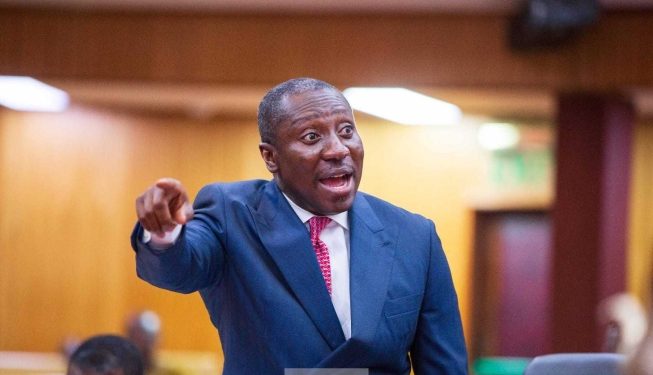NPP Minority Challenges 2025 Budget Deficit Figures, Alleges Data Manipulation
The opposition New Patriotic Party (NPP) Minority in Parliament has strongly contested the fiscal deficit figures presented in the 2025 Budget Statement, accusing the government of data misrepresentation and fiscal mismanagement.
At a press conference held on March 13 at Parliament House, the NPP Minority argued that the budget’s reported fiscal deficit of 7.6% of GDP and primary deficit of 3.6% of GDP lacked credibility, given the government’s own revenue performance and expenditure controls.
According to the Minority, the figures announced by Finance Minister Dr Cassiel Ato Forson were inflated by the inclusion of GH₵49.2 billion in expenditure claims, which they allege have no clear basis.
Fiscal Credibility at Risk
The NPP pointed to inconsistencies in the methodology used to compute the fiscal balances, arguing that the government had ignored the fiscal anchor agreed upon under the International Monetary Fund (IMF) programme in 2023.
Before Ghana entered the IMF programme, the government and the IMF had agreed to monitor fiscal balances on a commitment basis, tracking outstanding expenditure claims recorded in the Ghana Integrated Financial Management Information System (GIFMIS). This approach, they explained, was intended to ensure transparency in arrears accumulation without distorting deficit figures.
However, the Minority contended that the GH₵49.2 billion now included in the 2025 budget as expenditure claims was not properly verified or audited, and that the methodology used contradicts the technical memorandum of the IMF programme.
Disputed Expenditure Claims
The NPP further highlighted that in 2023, the Ministry of Finance had submitted an Arrears Clearance Strategy to the IMF, which placed the outstanding expenditure claims at GH₵47.5 billion. These arrears, according to the Minority, date back as far as 2012/2013 and should not have been presented as if they were accumulated in 2024.
The Minority argued that without conducting a thorough verification or audit, the government had irresponsibly incorporated unverified figures into the budget, thereby misrepresenting the country’s fiscal position.
Concerns Over IMF Agreement Compliance
The opposition also questioned whether the government’s fiscal calculations adhered to the IMF Technical Memorandum, which explicitly defines how to compute the primary balance.
According to the memorandum, fiscal balances should be measured on a cash basis, considering only outstanding payments reported in GIFMIS. The NPP Minority contends that the GH₵49.2 billion in claims does not fit this definition, as it includes multi-year arrears unrelated to statutory funds or energy payments.
Call for Accountability
The NPP Minority urged the government to clarify the methodology used in computing the fiscal balances and to ensure full compliance with IMF guidelines. They also questioned whether the technical experts at the Ministry of Finance had been overruled, given that the government had successfully passed three previous IMF reviews without such inconsistencies.
“The Finance Minister cannot use unaudited data to declare a fiscal deficit and primary balance that contradict the IMF’s agreed methodology,” the Minority stressed.
The controversy raises further concerns over the credibility of Ghana’s fiscal management under the Mahama administration, with potential implications for investor confidence and ongoing negotiations with the IMF.








